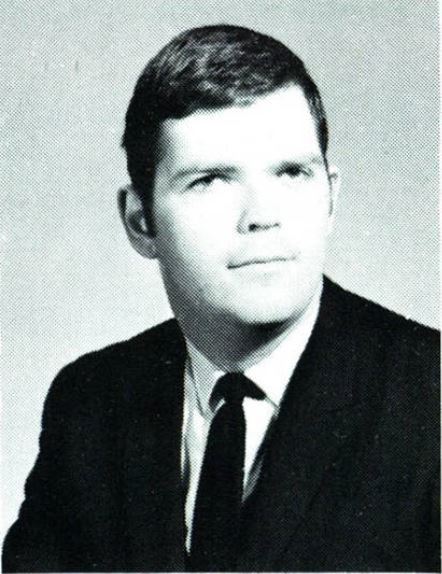On Oct. 26, 1973, “The DePaulia” reported a “wild and far out experience” was coming to DePaul courtesy of the DePaul Geographical Society: a ghost tour. Named “Field Trip in Ghastly Geography,” the tour was designed by DePaul alum Richard Crowe. The excursion took place that Oct. 27 and was not only one of the first ghost tours in Chicago, but also marked the beginning of Crowe’s illustrious career as Chicago’s most famous ghost hunter.
The origins of Richard Crowe’s interest in ghosts and the paranormal stretched all the way back to his childhood, when he listened to his grandparents tell stories of ghosts in Hungary and Poland. His interest only grew as a student at Quigley Preparatory Seminary South, where he befriended the Rev. John Nicola, who would later serve as technical advisor for the film adaptation of “The Exorcist.”
 Richard Crowe's senior picture from 1970. (Image courtesy of Special Collections and Archives)
Richard Crowe's senior picture from 1970. (Image courtesy of Special Collections and Archives)
During his undergraduate years at DePaul, Crowe studied English and was a well-known and active presence on campus, participating in a multitude of activities including a prominent role on the Student Activity Council. He also wrote for “The DePaulia,” and while many of his articles covered topics one would expect of a college student in the late 1960s – politics and university issues – his interest in the paranormal still bled through now and then. A November 1967 article told the story of Snippy, a horse whose death may have been the result of a UFO. A January 1968 article, meanwhile, gave a thorough overview of the Bigfoot legend. With this in mind, it is unsurprising, following his graduation from DePaul with a Master’s degree in 1973, the university’s Geographical Society approached Crowe about designing a ghost tour for one of their fall field trips.
Anyone who happened to catch “The DePaulia” snippet about the ghost tour the day before its occurrence would have been out of luck. The tour had a waiting list of 200 people, and its 50 attendees ranged from Geographical Society members to Chicago radio personalities. The tour lasted more than four hours and visited eight sites, including the site of the St. Valentine’s Day Massacre, the road walked by Resurrection Mary and Bachelor’s Grove Cemetery. “The DePaulia” staff member on the tour noted while no ghosts or other ephemeral beings were spotted, “Mr. Crowe made the trip quite entertaining.”
It was Crowe’s skills as a storyteller that enabled him to become Chicago’s first full-time ghost hunter. The October 1973 tour served as the starting point for Crowe’s business, Chicago Supernatural Tours, which became successful so quickly Crowe was a full-time “researcher into the unknown” by 1979. Crowe stayed active with the DePaul community throughout the 1980s, continuing to host his tour for the Geographical Society and giving talks at the university on topics ranging from ghosts to Irish folklore. Chicago Supernatural Tours’ buses even continued to use DePaul parking lots as their starting location for several years.
It did not take long for Crowe to become an international expert on the paranormal. Every Halloween season, Crowe would appear on countless radio and talk shows, including “Oprah” and “Unsolved Mysteries.” He was a Halloween staple in the “Chicago Tribune,” with countless issues featuring profiles and interviews focused on Crowe. The newspaper credited Crowe with both creating Chicago’s first ghost tour and with popularizing the Resurrection Mary myth, which, prior to inclusion in his tours, was a little known local fable. Today, Resurrection Mary is arguably Chicago’s most famous ghost.
In a 1986 interview with “The DePaulia,” Crowe explained his process for finding stories for tours and research. A great deal of his research originated in the same way most legends do - the oral tradition. A large portion of these came from local folklore and stories told to him by both friends and strangers. He also scoured newspapers, noting locations for car accidents or murders were often prime places for “a good ghost hunt.” In other words, Crowe’s success lay in his ability to find and tell a compelling story – no ghosts need apply.
Crowe died on June 6, 2012. His “Chicago Tribune” obituary included quotes from fellow Chicago ghost hunter Ursula Bielski, who credited Crowe with inspiring her own career in the paranormal. She also noted Crowe’s penchant for telling a great story.
"He was such a folklorist — that was his passion,” she explained. “He brought all those stories of the stockyards and pubs...to everyone."
Through his supernatural tours, Crowe sparked interest not only in ghost stories, but also in the history of Chicago. He took stories that may otherwise have faded into obscurity and helped to make them part of the city’s folklore and culture.